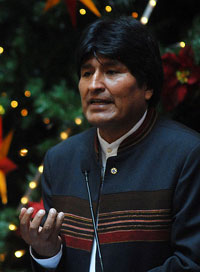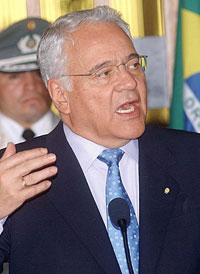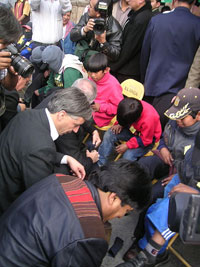 Juan Evo Morales Ayma is the first indigenous president in the history of Bolivia.
Juan Evo Morales Ayma is the first indigenous president in the history of Bolivia.
Morales led the Movement to Socialism (MAS for its name in Spanish), which had "Change" as its slogan. This basically translates into the intention to eliminate the differences between the north and the south, to recover ownership of natural resources, to have more sovereignty, to put an end to discrimination, etc.
The MAS party is grounded in social movements which ran a series of protests in Bolivia at the beginning of this century. One of the most important took place in October, 2003, and has been named "The Gas War."
This conflict arose when then-president Gonzalo Sánchez de Lozada (Goni)decided to export gas via Chile (the country that took away Bolivia's outlet to the sea when it won the War of the Pacific). This measure led to blockades and riots in the western part of the country. The government reacted with violence that cost a large number of lives in El Alto and Warisata.
 As a result, the population rose up asking for Sánchez de Lozada's resignation. On October 17, 2003, Gonzalo Sánchez de Lozada resigned and escaped to the United States after withdrawling millions from the Bolivian National bank. Until today he lives there under the protection of the US government. Carlos D. Mesa replaced him as president under constitutional succession. In June, 2005, Mesa resigned under pressure from the massive protests asking for nationalization of natural resources, and shortly thereafter Eduardo Rodríguez Veltzé became president as required by the constitution. He held office until January 22, 2006 when Evo Morales became president after winning the elections in December 2005 with an absolute majority of 54%.
As a result, the population rose up asking for Sánchez de Lozada's resignation. On October 17, 2003, Gonzalo Sánchez de Lozada resigned and escaped to the United States after withdrawling millions from the Bolivian National bank. Until today he lives there under the protection of the US government. Carlos D. Mesa replaced him as president under constitutional succession. In June, 2005, Mesa resigned under pressure from the massive protests asking for nationalization of natural resources, and shortly thereafter Eduardo Rodríguez Veltzé became president as required by the constitution. He held office until January 22, 2006 when Evo Morales became president after winning the elections in December 2005 with an absolute majority of 54%.
Biography
Evo Morales was born in Oruro (Orinoca) in 1959 to a mining family. He spent his childhood working in the fields, going to school and playing soccer.
At an early age his leadership abilities became evident.
In order to continue his schooling, he moved to the city of Oruro where he worked as a mason, baker and trumpet player. He played in the Royal Imperial Band, which made it possible for him to travel and get to know different points of view. However, he did not finish high school.
Once he completed his mandatory military service, he returned to his community.
In 1980 when the climatic phenomenon known as El Niño destroyed 70% of the crops and killed 50% of the livestock, Evo and his family had to move to the Chapare, the Cochabamba tropics.
Coca Growing Trade Unionist
In 1981 he was named secretary for sports in his union, and in 1985 he became its general secretary. In 1988, during the MNR government, the Coca and Controlled Substance Law was enacted with the goal to eliminate or replace surplus coca crops, and Morales was promoted by his associates to Executive Secretary of the Federación del Trópico.
During his career he has been in prison and near death.
In the nineties, the coca growers fought the government of Hugo Banzer on many occasions. Banzer's government had promised the United States that it would totally eradicate the coca leaf (Zero Coca), and Morales was one of the big coca growing leaders at that time that defended the crop (sacred to the Aymara), seeking protection with the motto "Coca is not cocaine." This led to the coca leaf's becoming a symbol of defending the dignity and sovereignty of the country against the United States.
In 1997, Evo Morales participated in the general elections ad was elected to parliament as a representative from Cochabamba.
In the 2002 elections, Morales received significant support (20.9%), which is remembered as one of the big surprises in the voting results.
First Term
 Once he was inaugurated in January 2006 in an Aymara religious ceremony at Tiwanacu, having won the December 2005 election with 53.74%, Morales proclaimed the need to nationalize the petroleum industry.
Once he was inaugurated in January 2006 in an Aymara religious ceremony at Tiwanacu, having won the December 2005 election with 53.74%, Morales proclaimed the need to nationalize the petroleum industry.
One of his first measures was to cut public administration salaries by 57% and to announce prosecution of liability suits against former leaders. During 2006, he called the Constitutional Assembly, and in 2007 the New Political Constitution of the State was approved by half the membership.
During a referendum in 2009, the people said "yes" by 62% to the New Political Constitution of the State.
Second Term
On December 6, 2009, Evo Morales was re-elected with 63% of the vote. In municipal and departmental elections in 2010, MAS won with a "taste of defeat," like the El Alto leaders said, since they won 6 out of 10 administrations and lost 10 of the most important mayoralties in the country. The latter included the city of La Paz, which was a bastion of the MAS and the most important mayoralty in the country.
On Christmas Eve 2010, Vice President Álvaro García Linera decreed the highest rise in prices for petroleum products (Gasolinazo) in the history of Bolivia, alleging that it was necessary to adjust prices to balance the economy, eliminate smuggling and avoid future crises.
In response to this measure, the people who were affected mobilized and generated a wave of protests (blockades, strikes and riots, etc.).
Faced with popular pressure, on the night of January 31, 2010, President Evo Morales voided the decree that established the rise in fuel prices with the argument that he governs by "obeying the people."


